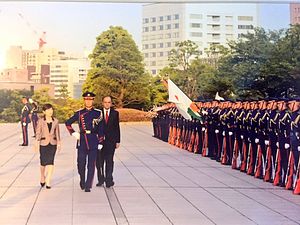Arun Jaitley, India’s new minister of defense, and his Japanese counterpart, Tomomi Inada, met in Tokyo on April 8 to discuss deepening military cooperation between the two countries amid heightened tensions in the region, according to a Japan Ministry of Defense (MoD) press release. Jaitley, who also doubles as India’s finance minister, was in Tokyo to attend an annual meeting of the Asian Development Bank.
In a joint statement issued following the meeting, Jaitley and Inada reiterated their support for the Japan-India Special Strategic and Global Partnership first announced in 2006. The statement also reiterates the importance of deeper strategic ties and the need to advance defense cooperation for regional peace and security.
The ministers also discussed the situation on the Korean Peninsula and the increasing tensions caused by North Korea’s recent actions, the press release notes.
The defense ministers agreed to further bilateral and multilateral military exercises involving the armed forces of both countries and welcomed the upcoming trilateral Malabar naval drill. In 2015, Japan became a permanent member of the annual Malabar naval exercise, originally a bilateral naval drill between the United States and India.
In 2016, the Japan Maritime Self Defense Force (JMSDF) dispatched the 19,000-ton JS Hyuga — the lead ship of the Hyuga-class of helicopter carriers — to participate in the 2016 iteration of the Malabar exercise. This year’s exercise will be held in the Bay of Bengal in July. The JMSDF will send its largest warship, the helicopter carrier JS Izumo, to take part in the drill.
During the 2016 Indo-Japanese Defense Ministerial Meeting, India and Japan agreed to explore setting up a Maritime Strategic Dialogue and a possible joint bilateral naval exercise for 2017. However, neither the new bilateral framework for the discussion of maritime security issues nor the exercise were mentioned by the ministers.
Indian and Japanese defense and foreign ministry personnel have been holding a lower level recurring maritime security dialogue for years. Since 2012, the Indian Navy and JMSDF have held the Japan-India Maritime Exercise.
Japanese and Indian defense officials interact through a number of bilateral forums including the 2+2 Dialogue, Defense Policy Dialogue, and a Coast Guard-to-Coast Guard cooperation dialogue. In 2016, India and Japan also set up the first dialogue between both countries’ air forces.
During last year’s defense ministerial meeting, Japan purportedly pressed India to clarify its position on the South China Sea territorial disputes. (India’s position on the South China Sea disputes has been murky as The Diplomat reported in 2016.)
The result was a joint statement issued by then-Indian Defense Minister Manohar Parrikar and Japanese Defense Minister Gen Nakatani in which the ministers called all parties to “show utmost respect” for the UN Convention on the Law of the Sea (UNCLOS) following the 2016 ruling by the Permanent Court of Arbitration about China’s maritime claims and actions in the South China Sea.
The ministers also stressed the need for the dispute to be solved by peaceful means. Indian Prime Minister Narendra Modi and Japanese Prime Minister Shinzo Abe reiterated their support for a peaceful solution of the South China Sea disputes in the spirit of UNCLOS in a joint statement in November 2016.
While the joint South China Sea statements — both countries first issued a statement on the maritime disputes in December 2015 — appear to be somewhat innocuous and non-committal, they nevertheless underline a growing convergence of Indian and Japanese interests on a number of security-related policy issues.
However, India-Japan defense and security cooperation remains a work in progress. A case in point is that despite the pledge to deepen bilateral defense ties and the establishment of a Joint Working Group on Defense Equipment and Technology Cooperation, the May 2017 statement did not contain an update on a $1.3 billion defense deal over the procurement of 12 Japan-made ShinMaywa US-2 amphibious search-and-rescue aircraft for the Indian Navy.

































